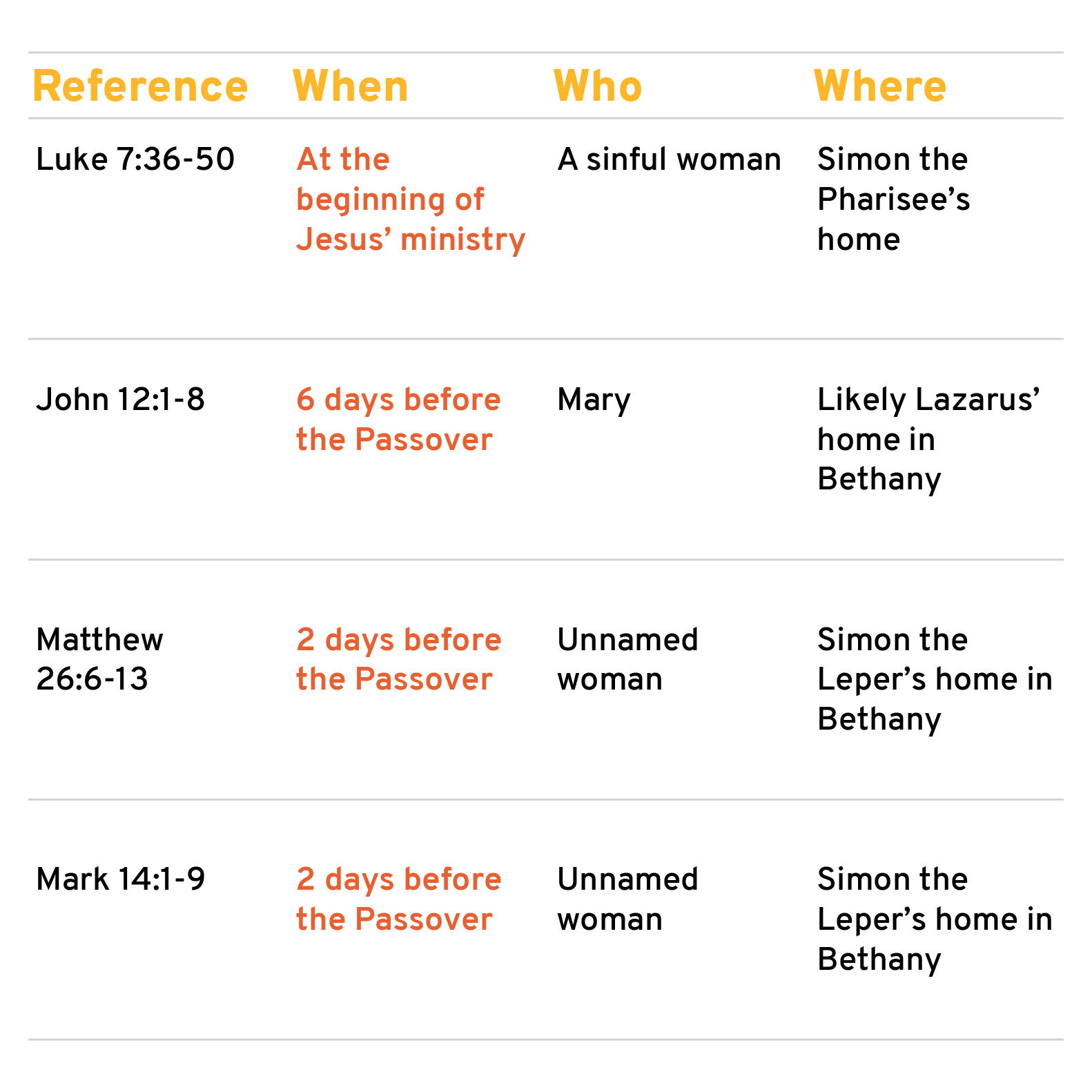She held a treasured alabaster jar of perfume in her hands, broke its neck, and lavished it on Jesus, just days before He was put to death.
Finally broken, the overwhelming fragrance of a pint of pure nard – an expensive oil probably extracted from the root of the Indian nard plant – would have filled the room and captured everyone’s attention.
This use of nard went above and beyond ancient Middle Eastern hospitality towards guests; it was the best perfume money could buy.
Each of the four Gospels records an account of the anointing of Jesus. In Matthew, Mark and John’s account, the anointing takes place in the week leading up to Jesus’ death, where He also explains that this anointing was in preparation of His burial.
Some view the accounts as different perspectives of the same event but it is also probable that Jesus was actually anointed three times: Once early in his ministry and twice during Passover week.

In John’s account of the anointing, the Mary who broke the alabaster jar was the Mary who sat and listened at Jesus’ feet, the same Mary whose brother Lazarus was raised back to life by Jesus.
Understanding this, it’s not that incredulous or ridiculous that she would have lavished such love on Jesus. Mary had always paid attention to Jesus Christ, and as she took notice of all that he’d heard him say and seen him do, it is not a stretch to say her heart might have long settled on devotion.
ANOINTED IN PREPARATION FOR HIS DEATH
It was Jewish custom to anoint a body for burial. In Matthew’s gospel, the only anointing that Jesus received in preparation for His burial took place 2 days before his death at the house of Simon the Leper – also by a woman, but this time unnamed.
The Gospels of Matthew and Mark do not identify the woman, but could this woman be Mary? Perhaps she understood what Jesus had said the previous time, 4 days before, when He defended her use of the expensive oil and asked her to keep it for His burial.
But what happens on all accounts – whether 2 days or 6 days before Jesus’s death– is the disciples’ similar reaction to the woman’s extravagance towards Jesus.
“There were some who said to themselves indignantly, ‘Why was the ointment wasted like that? For this ointment could have been sold for more than three hundred denarii and given to the poor.’ And they scolded her.
“But Jesus said, ‘Leave her alone. Why do you trouble her? She has done a beautiful thing to me. For you always have the poor with you, and whenever you want, you can do good for them. But you will not always have me.'” (Mark 14:4-7)
Their observation wasn’t wrong! But in their near-sightedness, they couldn’t see what was better.
“Although the objectors seem to be advocating an ethical cause,” writes Julie M. Smith, “what they are actually doing is focusing on the economic aspect of the anointing instead of its spiritual implications. This fits a pattern in Mark’s gospel where people focus on the wrong thing.”
“… There will be times we are tempted to take a good course of action and pass over one that is even better. Selling the perfume and giving the money to the poor would have been a generous gesture and a way of honouring Jesus…” (Guy Brandon)
But the extravagance of “wasting” it by pouring the nard on him, says Guy Brandon, was an even better one. The anointing had spiritual implications that also revealed the readiness and willingness of one’s heart to honour Jesus as Lord and soon-to-be Saviour.
Even if the money could have been used for another good purpose, the priority at hand, at least for the woman, was to anoint Jesus in preparation for His death – one that will overcome Death itself.
“Those who complain that the cost is too great represent those who are willing to sacrifice only up to a point. They see her gift as excessive and wonder if one can be a true follower but give a little less. Jesus answers negatively; her gift is appropriate and necessary, no more extravagant than the death and kingship that it acknowledges.” (Julie M. Smith)
The anointing of Jesus had a dual purpose: To prepare him for burial and to anoint him as King. No gift could have been too extravagant for a moment like this.
WALK THE TALK
Some in the room – people who would have been closest to Jesus – reacted to the “waste” of the expensive oil, claiming that the money should have been given to the poor instead.
“However,” Brandon further observes, “We are more than capable of deluding ourselves and certainly adept at misleading other people. ‘All a person’s ways seem pure to them, but motives are weighed by the Lord.’ (Proverbs 16:2).”
What if Jesus was asking those who pointed their fingers at the woman in how she chose to use her wealth: What have you done with your money? When did you last give to the poor?
We can only read of what happened 2,000 years ago when Jesus was anointed by an unnamed woman in tears and repentance, but we have to decide every day whether He is worth our devotion – in every aspect of service and love unto King Jesus.
Will we break the alabaster jar of our lives at His feet to anoint Him?
He will come back as King and His words for us are these: ‘Truly I tell you, whatever you did for one of the least of these brothers and sisters of mine, you did for me.’” (Matthew 25:40)
This Holy Week, as we retrace the steps that Jesus took before He arrived on the cross, we ask for fresh grace from the Holy Spirit to grasp the fullness of His words to us. And to discern what is the better thing to do in each situation.
We can never out-give God’s love towards us, so nothing we pour out – time, strength, devotion – will ever be wasted. Others might be shocked at our devotion towards Christ, but what matters most is whether He is pleased with it (Mark 14:6).
FOR MORE PASSION WEEK STORIES:
- Why did Jesus say that the woman had done a beautiful thing?
- Do you see a link between extravagance towards Jesus and generosity towards people?
- Do you think “being practical” can be a guise for our reluctance to give?









